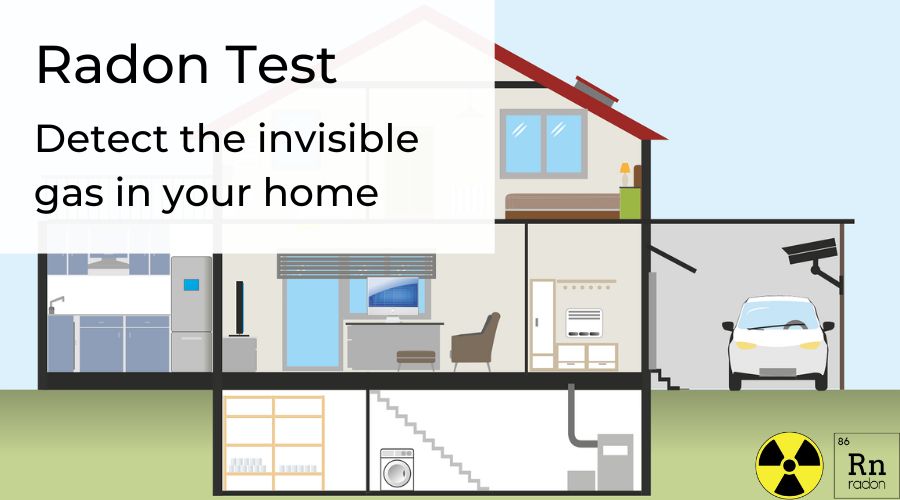Imagine this…

Scenario: Radon Testing – detect the invisible gas
Imagine you’ve recently moved into a beautiful new home in a serene suburban neighborhood. Everything seems perfect—the spacious rooms, the lush backyard, and the friendly neighbors. However, there’s something you hadn’t considered: radon, a colorless, odorless gas that can seep into homes and pose a silent danger to your family’s health.
After hearing about radon risks from a neighbor, you decide it’s time to take action. You want to ensure the safety of your loved ones, so you decide to have your home tested for radon. This decision becomes even more crucial if your area is known for having high radon levels.
You contact a professional radon testing company, and they promptly schedule an inspection. During the test, they use specialized equipment to measure radon levels in your home’s basement and living areas. The results are concerning—higher than the recommended safety thresholds.
Now, you find yourself faced with a critical choice: mitigation. You need to take steps to reduce radon levels in your home and protect your family from potential health issues, including lung cancer.
This situation highlights the importance of radon testing. It’s a real, invisible threat that can affect any home, and being proactive about testing and mitigation can make all the difference in ensuring your family’s well-being in your new dream home.
What is Radon Testing?

Radon is a naturally occurring radioactive gas that is odorless, colorless, and tasteless. It can seep into your home through the soil or rock upon which your home is built. Radon gas can build up to high levels in enclosed spaces such as basements, and long-term exposure to high levels of radon can cause lung cancer. Therefore, it is important to have a radon testing inspection done on your property before buying it.
A professional inspector will use specialized equipment to test for radon levels in the home. The testing is typically done over the course of several days to get an accurate reading of the average radon levels. If high levels of radon are detected, the inspector will recommend remediation measures to mitigate the risk.
Why is it important?

A radon testing inspection is particularly important for properties in high-risk areas or areas where radon is known to be a problem. It can provide peace of mind and ensure that you and your family are not exposed to dangerous levels of this harmful gas.
Radon testing is crucial for several important reasons:
- Health Risks: Radon is a radioactive gas that occurs naturally in the soil and can seep into homes. Prolonged exposure to elevated radon levels is the second leading cause of lung cancer, responsible for thousands of deaths each year. Testing helps identify if your home has high radon levels, allowing you to take necessary measures to reduce exposure and protect your health.
- Invisible and Odorless: Radon is odorless and colorless, making it impossible to detect without specialized equipment. Without testing, you may be unaware of its presence until health problems arise.
- Peace of Mind: Testing provides peace of mind. Knowing your home’s radon levels are within safe limits ensures a healthier and safer living environment for you and your family.
- Real Estate Transactions: Many real estate transactions require radon testing as part of the home inspection process. Sellers can address radon issues before listing, and buyers can make informed decisions about a property’s safety.
- Mitigation: If testing reveals elevated radon levels, you can take steps to mitigate the problem. Radon mitigation systems can effectively reduce radon levels, making your home safer to inhabit.
- Preventive Measures: Radon testing allows for preventive measures. Even if your home currently has low radon levels, periodic testing can catch any potential increases and address them before they become hazardous.
- Protecting Vulnerable Groups: Certain individuals, such as smokers and those with preexisting respiratory conditions, are at a higher risk from radon exposure. Testing and mitigation can be particularly important for protecting vulnerable members of your household.
In summary, radon testing is important to safeguard your health, ensure the safety of your living environment, and make informed decisions when buying or selling a home. It’s a proactive measure that can ultimately save lives by reducing the risk of lung cancer associated with radon exposure.
In summary, a radon testing inspection is an essential part of the home buying process, and can help ensure that the property you are considering is safe and free from radon gas.
Contact us and don’t let hidden threats undermine your property’s value. Invest in a thorough termite and pest inspection to safeguard your home from potential damage and preserve its integrity for years to come.
Follow us!
For more details you may also follow our Facebook, Instagram, and YouTube!




